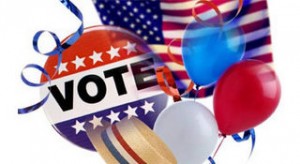Voting advocates and sitting legislators, including members of the Congressional Black Caucus, began expressing concern as early 2012 that many African Americans would sidestep mid-term elections to the detriment of their local officials, effectively placing the House and the Senate into conservative, Republican hands.

Voter turnout regularly drops in midterm elections, and has done so since the 1840s. In 2008, for instance, 57.1 percent of the voting-age population cast ballots — the highest level in four decades — as President Barack Obama took office. Two years later, only 36.9 percent voted in the mid-term election that put the House back in Republican hands.
Even though higher than expected turnouts in D.C. came on-behalf of non-profits, churches, and colleges providing on-the-ground transportation, the total number was still not expected to reach beyond the 60 percent mark for total eligible voters, according to Vote4Justice data.
Further, according to the Maryland County Elections Board, Prince George’s County residents followed the general pattern of voting overwhelmingly in presidential elections, but demonstrated a noticeable decline in voting habits for mid-term elections.
Early voting numbers for Prince George’s County showed the predominantly African-American enclave boasted 46,236 early votes – a little more than 8 percent of the 544,677 total active eligible voters. And while the numbers are an increase over previous years, many fear that when the numbers are officially tallied next week, the number of African American voters will remain comparatively low.
Drew Desilver wrote in the Pew Research Center’s July 2014 FactTank: News In the Numbers that “in an era of increasingly polarized politics, campaign strategists must decide how much effort to put into persuading independent-minded voters to come out and support their candidate without antagonizing their party’s core supporters, who are more likely to vote anyway. Obama’s victories in 2008 and 2012 were largely due to his campaign’s success in expanding the electorate — inspiring new voters and increasing turnout among Blacks.”
President Obama offered a stinging, but good-natured admonishment at an Upper Marlboro crowd gathered for Maryland Democratic gubernatorial candidate Anthony Brown, recently.
“It will be a done deal if you vote, but you’ve got to get that cousin ‘Pookie’ sitting at home on the couch. He’s watching football right now instead of being here at this rally. You’ve got to talk to him and let him know it is not that hard to exercise the franchise that previous generations fought so hard to obtain,” Obama said.
Encouraging Pookie to vote will be harder than expected as demonstrated Nov. 4. Exit pollsters were able to assess a continuing lack of interest in voting among urban, disenfranchised Black youth.
Outside the Greenleaf Recreation Center in Southwest D.C., for instance, a body of roughly fifteen young men lounged in their public housing yards, uninterested in the bottlenecked traffic just feet away. Campaign volunteers spent the day calling over to them, attempting to coax them into the voting booths inside. When asked why they had not and would not vote in the D.C. elections, the comments were thunderous and angry.
“They don’t listen to us anyway. Just look at this neighborhood where the city has let developers in to tear down our homes and put up stadiums where we are not welcome and apartments we cannot afford to live in,” DeMarcus Fortune said. “How do you choose to elect a person as mayor who keeps calling this change positive when it negatively impacts you?”
Fortune, said that his grandmother’s home used to sit on a corner near Half Street in Southeast, currently used as a parking lot for Nationals Park; his elementary school, Syphax, has been gutted and rehabbed into a luxury condominium. Despite its condition, Fortune said that house was one his grandmother had saved half her life to purchase and rear her family.
Tony Wright, one of his buddies, echoed similar sentiments.
“I know that people fought and died for my right to vote, but who do you vote for when you don’t trust any of the contenders? Politicians call our neighborhood ‘blighted’ and look at us like we’re garbage. We’re the trash that has to be removed in order for them to improve the city. Bowser, Cantania, and Schwartz have automatic messages calling my house all day and night, but none had enough courtesy to come here. I pay taxes, I go to work every day and probably work harder at it than most people, so why do my interests not count?” Wright asked.
Election Day returns for Wards 7 and 8, show dismal turnouts – in Ward 7, of the 58,378 eligible voters registered, only 26 percent (15,348) cast ballots; in Ward 8, that percentage was even less, with 21.49 percent of the 51,340 eligible voters (roughly 11,000) casting ballots.

